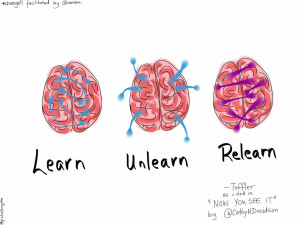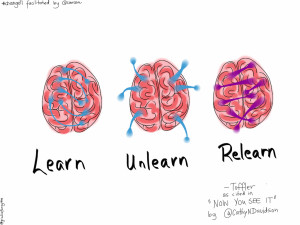Unlearning What We No Longer Need


“The first problem for all of us, men and women, is not to learn, but to unlearn.” Â -Gloria Steinem
We spend a substantial portion of our lives learning, either formally or informally.  Once we’re done with school, we enter into some kind of life role or employment position and usually experience a learning curve.  Once we reach stability on that learning curve, life may throw us another transition to navigate.  And it continues like that – once we think we’ve reached a comfortable level of mastery over our environment, we are faced with yet another change to which we must adapt.  In this way, learning is often synonymous with adapting to changing circumstances.
But there’s another element to learning that we often overlook, precisely because it is so counterintuitive. Â To make way for new patterns of thinking that allow us to adapt to new environments and circumstances, we often must unlearn old patterns and behaviors that are no longer useful. Â In fact, much of our adaptation to change consists of unlearning all those forms of conditioning that we’ve relied upon for years.
Here’s an example to which many people can relate.  Say you grew up in an environment where high expectations were the norm and you were chided whenever you fell short – it could have been at home, school, or on a sports team or extracurricular activity.  As a result, you may have learned to habitually chide yourself any time you fell short of perfect execution (which, as you’ve probably learned the hard way, is far more common than actually doing things perfectly).  As you grew older, your difficulty with being compassionate with yourself may have introduced strain into your relationships – perhaps, for example, it contributed to your feeling less confident among your friends, or challenged your ability to extend compassion to others.  Based on this example, many people are faced with the arduous task of unlearning those nearly-impossible standards of perfection by which they judge themselves (and often others as well).
The process of unlearning thought patterns and behaviors, especially those like the example above, is probably one of the hardest tasks we will ever undertake, and it can take years.  Think about how long it took you to learn and practice those behaviors – perhaps many decades – so try not to be too hard on yourself when you find yourself repeating them, even when you know it’s counterproductive.  The fact that you’ve even developed awareness of the behavior and the need to unlearn it is a huge step and will gradually pave the way for change, with time and patience.
Our yoga practice is a great way to zero in on these behaviors we need to unlearn. Â By sitting on your mat and connecting to your breath, you inevitably have to face thought patterns and beliefs that simply aren’t comfortable. Â But instead of running away, you sit with them. Â You endure them. Â You breathe through them. Â You move through them. Â And sometimes it’s not pretty. Â But regardless of whether or not it’s a seamless process, you get through it.
And when you repeat this over and over again, things can start to change.  Over time, those dreaded quiet moments can teach you to stop before you react to things that bother you – whether it’s on your yoga mat or elsewhere in your life.  You develop the ability to pause and consider how you might respond differently to a situation that would have previously triggered you to react in a less-than-compassionate way.
With time and consistent practice – which will usually involve steps forward and backward along the way – this new habit will replace some of the older, less productive habits you’ve developed.
We can never underestimate the importance of unlearning habits once they no longer serve our highest good.  It’s one of the most difficult, yet most rewarding, endeavors we can attempt!
[whohit]blog-unlearn[/whohit]
